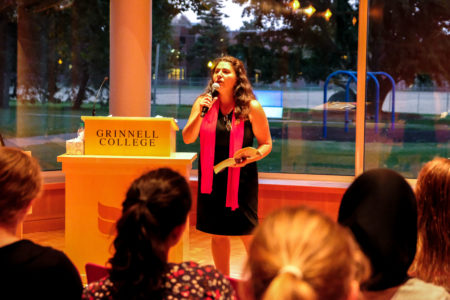Professor of comparative literature and Middle Eastern studies at the University of Arkansas and award-winning author Mohja Kahf came to Grinnell to discuss belonging. Kahf sat down with The S&B’s Kelly Page to talk about writing as both an emotional and political responsibility.
The S&B: I noticed that in your work you show some problematic elements, like racism or classism, in people who are themselves victims of other people’s violence, in this case the Massacre of Hama. Why do you think that is important to show those facets of people?
Mohja Kahf: In order to do dual critique and not be co-opted by either side. In order to do multi-faceted critique you have to acknowledge the complexity of people who are also themselves victims of external oppression while they are also committing oppression themselves in other ways.
As a writer, how do you think writers can change social problems, especially in the context of Syria and immigration?
… I don’t know if I can change anything, you know. People wrote and wrote and wrote. Syrians wrote and wrote and wrote the names of those who were imprisoned without charge, taken into the dark, killed in the dark and all we can do is keep saying their names and many, many, many times it did not help. It was futile, it was a wall, and then sometimes it did help, and you can’t not do it. You can’t not say their names, and you can’t not write about them, and you can’t not make the effort. “Though your promise count for nothing, you must keep it nonetheless.” … Leonard Cohen. …Yeah so that’s kinda my motto.
I’d like to ask, just as an aspiring writer myself, do you have any advice for people who want to write?
You know what really helped me? Books like “The Artist’s Way” by Julia Cameron. And other books, I mean there’s no one magic prescription. … Do that self-care of the writer. Take care of the writer. Don’t put the writer in a corner and prioritize everything else, even though yes you have to pay the rent and you have to pay the groceries, but find time to cherish and honor the writer within. Give that writer a throne to sit on and a place to do her work — and the time — and your energy.
And then, I guess, do you want to go back to the question of why you write?
Writing became really central to my identity somewhere a few decades past. Then a few years ago, after about two and a half to three years of relentless killing in Syria, there were times when I was just writing about it 24/7 almost, between tweeting — I mean I don’t even remember eating and sleeping, but I guess I must have, and then I realized that I hit a wall, and to think that it’s efficacious in that way is not always the most productive thing. … I realized how foolish, sort of self-aggrandizing it is for writers to think that they can change anything, and yet you must keep the promise nonetheless. You must follow through on that promise. … I’m not saying everything has to be a quote unquote activist poem or a political rant, but if in some way the creation of that bit of beauty, that bit of communication that you are writing, in some way, however indirect, if it is not to improve life on this planet, what is it for? … I’m sorry if this seems old-fashioned, but it must be in the service of humanity, somehow, some way. I think there’s gotta be some intentionality behind it with the artist, in whatever little tiny minute way. That’s a giant canvas, right, and you could just be working on a tiny little brush stroke, and that’s okay.

Photo by Mayu Sakae



















































